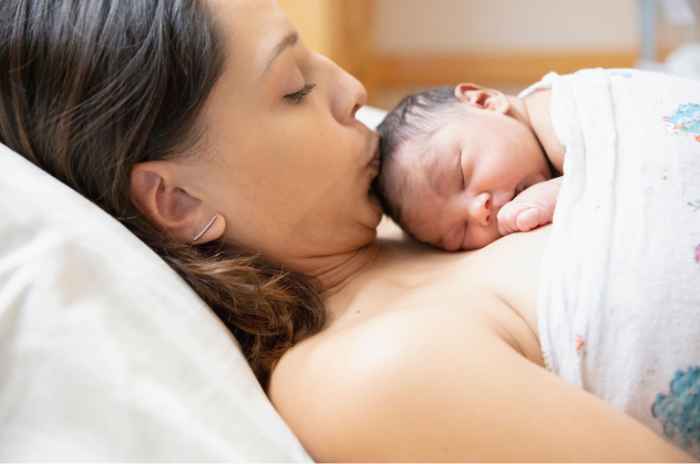
Having a baby is both an exciting and challenging time. Whether you’re a new mum or you’ve had a baby before, those newborn days can feel exhausting and exhilarating all at once.
While it is normal to go through ups and downs as you adjust to having a little one, some women have the added challenge of navigating postpartum depression.
According to The Australian Institute of Health and Welfare, “Depression and anxiety are common perinatal mental health conditions experienced during the perinatal period with impacts ranging from mild to severe [...] Mental health conditions during the perinatal period are common, affecting an estimated 1 in 5 mothers and can have serious effects on the health and wellbeing of women, their babies and families.”
Understanding the signs of postpartum depression and how to cope is important to help you manage during this difficult time. We hope our tips help you during your postpartum period.

What is Postpartum Depression?
There are many types of depression. According to Olivia Marcellino, VP of Research at Recovery.com these include: “clinical depression, persistent depressive disorder (or major depressive disorder), postpartum depression, and bipolar disorder.”
Postpartum depression is a type of depression specific to parents. It can start from the conception of the baby and last through to their first birthday. And it’s not just experienced by women. Postpartum depression can also affect fathers and partners.
How to Identify Symptoms of Postpartum Depression
Many women find it difficult to know whether the feelings they’re experiencing are a normal part of postpartum or not. In the first few weeks after giving birth a woman experiences many hormonal changes and mood fluctuations which often cause her to feel down, anxious, and tearful. This, alongside limited sleep and physical healing, can make functioning during the day particularly challenging.
However, at what point do these low feelings and tearful moments signify something more serious? How can you identify the symptoms of postpartum depression and know when it’s time to seek professional help?
Here are some signs that you may be experiencing postpartum depression:
Struggling to Connect with Your Baby
When you are pregnant, everyone tells you how wonderful it will feel to meet your baby for the first time and hold them in your arms. They talk about this amazing, all-encompassing love that washes over you.
However, some women don’t experience that feeling - at least not immediately. It’s important to note that some women need more time to bond with their baby and not connecting instantly with your baby does not automatically mean you have depression.
However, for mothers who have overwhelming feelings of sadness, disconnect, hopelessness, anxiety, and even anger, it may be they are suffering from postpartum depression and therefore are struggling to connect with their baby.

A Persistent Feeling of Sadness
In the early stages of motherhood, it’s completely normal to feel up and down emotionally. You may feel happy and then tearful, angry and then sad, multiple times a day. That’s just your hormones wreaking havoc in your newly postpartum body. And it’s a lot.
However, if you’ve been experiencing persistent feelings of sadness since the birth of your baby this could be an indication you’re suffering from postpartum depression. Alongside these feelings of sadness you may also lack enjoyment in your newborn, have a loss of interest in things you once enjoyed, and experience a general feeling of numbness.
Lack of Energy
Sound familiar? It has always seemed unfair that as part of postpartum care and as a way to identify depression in new mothers, we ask them whether they feel tired. Because the answer is nearly always; “Yes, I feel tired. I have a newborn!”
However, to clear things up; we’re not talking about feeling knackered from the lack of sleep, we’re specifically talking about the exhaustion that comes with postpartum depression. The constant lack of energy, the unrelenting tiredness, and the lack of emotional capacity to feel excited or energetic about anything. If you’re not feeling energetic and you lack excitement for the things you once felt excited about, this could be a sign you’re experiencing postpartum depression.
Isolating Yourself from Others
The postpartum period is well-known for being an isolating experience for many women. It can feel like you’re constantly feeding, burping, changing, and rocking your baby to sleep. It’s a constant and exhausting cycle. And, to be honest, it can make it difficult to get out of the house.
However, there’s a difference between struggling to keep up with social engagements and lacking the willingness to see or engage with anyone outside of your home. If you’re avoiding people, this could be a sign you are struggling with postpartum depression.
Social isolation is common among people who struggle with depression. It can feel safer to avoid people when you’re feeling depressed, however this isolation causes symptoms to worsen.
How to Deal with Postpartum Depression
The following strategies will help you stay mentally strong and healthy throughout the postpartum period so that you can be your best self for your baby and your family.

1. Reach Out to Friends and Family
In the midst of postpartum, it can often feel easier to withdraw from social engagements rather than engage in them. However, staying in touch with family and friends during this delicate period can be one of the best ways to stay mentally healthy. It also ensures you have someone to talk to when you’re having a rough day.
You can also seek postpartum counseling support. Sometimes, speaking with a professional is the best thing you can do. Postpartum therapy and postnatal depression counseling is an effective way to be vulnerable about your struggles.

2. Prioritise Time Outside
Whether you’re keen to start exercising or you can’t imagine ever having the time to exercise again, it’s important to stay active during the postpartum period. Just spending 30 minutes outside every day can make a difference to your mental health.
Most women like to walk a lot in the postpartum period. Walking is a great gentle exercise that aids your physical recovery without putting too much strain on your body in those early days. What’s more, it’s a great way to keep your mind clear and avoid spiraling thoughts. Oh, and it can be a great way to get your baby to sleep!

3. Eat a Well-balanced Diet
Eating well is especially difficult when you are struggling with postpartum depression. When you’re sleep-deprived, feeling low, and struggling to look after your newborn, the last thing you feel like is cooking a healthy meal.
Many women find it helpful to ask for help from family - especially during those early days. Others prepare healthy meals that are frozen ahead of time. Whatever method you choose, do your best to eat as well as you can to aid your recovery and cope with depression.

4. Make Time for Yourself
As a new mum, you probably feel like scoffing at this tip (and we don’t blame you!) However, stick with us because taking the time to look after yourself is one of the best ways you can cope with depression.
In the early days of motherhood, it can feel overwhelming to always be looking after a little person. You can feel like you’re never going to get alone time ever again. However, it is possible to take a little time for yourself each day. Whether it’s five minutes to make a cup of tea, half an hour in the evening for a bath, or a walk in the fresh air. You don’t have to be baby-free, but you do have to do something you enjoy.
5. Postpartum Therapy: Postpartum Depression Counselling
For many women, the best solution for postpartum depression is talking to an experienced therapist or counselor. Postpartum depression counseling is extremely popular. It provides a safe space for women to share their anxieties, discuss their birth trauma, and be vulnerable about their postpartum experience.
Final Words
Navigating the postpartum period is a challenging time for most women. If you are struggling, you are not alone. We hope the tips in this article will help you identify whether what you’re feeling is normal.
Remember, if you’re struggling and things don’t feel normal for you; it’s important to seek professional help. Reach out to your doctor and ask for an appointment. There is nothing wrong with struggling to cope. It’s okay. Admitting you need help is the first step. It doesn’t make you a bad mum, if anything it makes you strong!
ABOUT OUR CONTRIBUTOR:
Sophie Bishop is a medical, wellbeing and lifestyle writer. Sophie aims to spread awareness through her writing around issues to do with healthcare, wellbeing and sustainability and is looking to connect with an engaged audience. Contact Sophie via
website: https://sophiebishop.uk/
X: @SophBishJourno
LinkedIn: https://www.linkedin.com/in/sophie-bishop/
